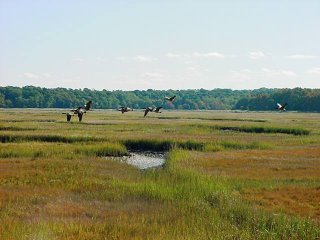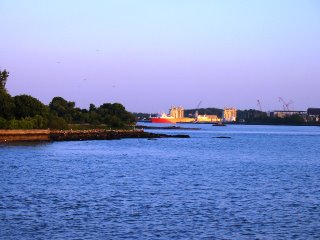 of both commissions pointed toward the need for conservation, restoration and public access facilitated by increased coordination between scientists, policy-makers, businesses and the general public. While the conclusions are relatively easy, going forward with implementing the recommendations is an enormous challenge for the conservation community. However, for Long Island, many of the issues can be solved by increased collaboration and awareness writes Newsday in a great five part series. JB
of both commissions pointed toward the need for conservation, restoration and public access facilitated by increased coordination between scientists, policy-makers, businesses and the general public. While the conclusions are relatively easy, going forward with implementing the recommendations is an enormous challenge for the conservation community. However, for Long Island, many of the issues can be solved by increased collaboration and awareness writes Newsday in a great five part series. JBNewsday Five Part Series:
Deep troubles: It's high time that we, as island-dwellers, started paying attention to the failing health of the waters around us.
http://www.newsday.com/news/printedition/stories/ny-vpuno044767304jun04,0,211730.story
Our lifestyle kills oceans. Long Island’s water hazards are as ubiquitous as parking lots and fertilizer.
http://www.newsday.com/news/opinion/ny-vpoce054769497jun05,0,5218697.story
Habitat Harmony: Science and industry need to work together to conserve fish.
http://www.newsday.com/news/opinion/ny-vpoce064770657jun06,0,696705.story
Sea Sense: They're all connected. Building back fish stocks takes an ecosystem-wide approach.
http://www.newsday.com/news/opinion/ny-vpoce074771725jun07,0,565632.story
Sea Sense: High-stakes fishing lawNew bill should diversify councils, respect science and set smart standards.
http://www.newsday.com/news/opinion/ny-vpoce084772981jun08,0,4301191.story
June 4, 2006
First in a series
This narrow finger of land, our island home, points steadily to the vast ocean that has beaten on its shores for so many millennia. The might of the sea is right there in our faces, but we don't pay a lot of attention.
Yes, we sit on the sand of some of the most beautiful beaches in the world and watch the waves roll in. Some of us venture out in small vessels of our own or in large party boats, to test our skills with hook and line against the survival instincts of the fish. We eat what commercial fishermen bring back to Montauk, the state's busiest fishing port - a catch dominated by such
 species as the Loligo squid, which becomes fried calamari, and the tilefish, which burrows into the ocean floor, consumes crustaceans, and tastes a lot like lobster.
species as the Loligo squid, which becomes fried calamari, and the tilefish, which burrows into the ocean floor, consumes crustaceans, and tastes a lot like lobster.But most of us don't spend much time thinking about the ocean, Long Island Sound, the Great South Bay, or the estuaries where fresh water meets salt in a network of bays, tributaries and tidal marshes that support a rich variety of aquatic life.
As we steer our cars through the crowded asphalt labyrinth of Long Island's roads, it doesn't often occur to us to worry about the rains that carry the gunk from those roads to the ocean, or about the fish who can't get upstream to complete their life cycle because they're unable to get past a dam that's now part of our transportation system.
Now is as good a time as any - and better than most - for all of us to start paying attention to the waters around us. Here are some reasons why:
Washington is changing the key rules.
For the first time in a decade, Congress is working on a significant update of the Magnuson-Stevens Act, the law that lays out the rules for managing our fisheries. It balances the short-term economic need for fishing today against controls needed to ensure the health of fish stocks and the future of fishing tomorrow. Court decisions have said the act puts conservation first.
House and Senate reauthorization bills differ sharply in some ways, but agree in others. The debate over them should be viewed in the context of our on-again, off-again effort to make sound ocean policy.
Before 1970, our nation's share of world fish catch had declined sharply, from second to sixth. American fishermen were angry about the vast amounts of fish that foreign factory trawlers were harvesting near our shores. So Congress reacted with corrective legislation in 1976 that came to be known simply as the Magnuson-Stevens Act.
That law expanded national jurisdiction over the ocean from 12 nautical miles off the shore to 200 miles, giving us an "exclusive economic zone" of 4.5 million square miles - larger than the lower 48 states. It set up eight regional fishery management councils to guard against overfishing. But the investment in American fleets that it encouraged also contributed to a situation of too many fishermen chasing too few fish.
The key Senate sponsor for the reauthorization bill is Sen. Ted Stevens (R-Alaska). His name is on the original act, which was improved by the 1996 Sustainable Fisheries Act. On another issue, his push to drill for oil in Alaska's Arctic National Wildlife Refuge, this page has compared him to the tough-to-kill Harry Potter villain, Lord Voldemort. Even if he is the Dark Lord of Drilling, he does know the subject of fishing, and his reauthorization bill makes more sense than the House version - though both have good features.
Commissions have sounded an alarm.
Two separate bodies, the independent Pew Oceans Commission and the congressionally appointed U.S. Commission on Ocean Policy, have studied the issues and reached remarkably similar conclusions. They say our oceans are suffering from coastal development, from pollution that storm-water runoff and other sources create, and from overfishing in some fisheries.
The broad principles that they have laid out make excellent sense, especially the dry-sounding but vital goal of ecosystem-based management: We can't keep our oceans healthy and our fisheries sustainable by managing them one species at a time. We have to look not only at the species we're trying to conserve, but at the complex interaction among that species, those it eats and those that prey on it, and the habitat that nourishes it.
To keep those reports from sitting untouched on the shelf, the chairmen of the two commissions have formed a Joint Ocean Commission Initiative and begun giving regular grades to government. And last month, the chairmen, Leon Panetta of the Pew Oceans Commission and Admiral James Watkins of the U.S. Commission on Ocean Policy, wasted no time in issuing a sharp analysis of the House bill after it emerged from a markup session.
Read more:
www.newsday.com
Deep troubles: It's high time that we, as island-dwellers, started paying attention to the failing health of the waters around us
http://www.newsday.com/news/printedition/stories/ny-vpuno044767304jun04,0,211730.story
Our lifestyle kills oceans. Long Island’s water hazards are as ubiquitous as parking lots and fertilizer
http://www.newsday.com/news/opinion/ny-vpoce054769497jun05,0,5218697.story
Habitat Harmony: Science and industry need to work together to conserve fish
http://www.newsday.com/news/opinion/ny-vpoce064770657jun06,0,696705.story
Sea Sense: They're all connected. Building back fish stocks takes an ecosystem-wide approach
http://www.newsday.com/news/opinion/ny-vpoce074771725jun07,0,565632.story
Sea Sense: High-stakes fishing lawNew bill should diversify councils, respect science and set smart standards
http://www.newsday.com/news/opinion/ny-vpoce084772981jun08,0,4301191.story
No comments:
Post a Comment